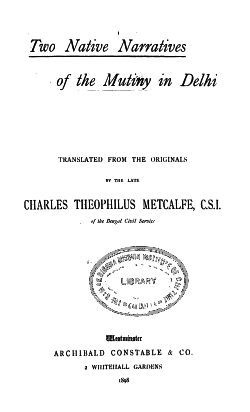Charles Theophilus Metcalfe and Mainodin Hassan Khan and Munshi Jeewan LalTwo Native Narratives of the Mutiny in Delhi 3>
Metcalfe, Charles Theophilus; Mainodin Hassan Khan; Munshi Jeewan Lal;
Two Native Narratives of the Mutiny in Delhi
Archibald Constable and Co. (Westminster), 1898, 182 pages
ISBN 1150526777, 9781150526770
topics: | history | 1857 |
In 1857, Mainodin [Muinuddin] Hassan Khan was kotwal (station in charge) at Pahargunge. He, along with his brother, had been appointed to the Delhi police by Thomas Metcalfe in 1848, and had also worked with C T Metcalfe, the author (son of TM). At the start of the mutiny, he helped in saving the life of John Metcalfe (brother to CTM). During the rebellion, he beccame the chief kotwal, and was appointed Colonel in the rebel army. However, in this work, which he handed over to a Britisher with the request not to publish it in his lifetime, he comes across as a strong sympathizer of the British.
Muinuddin fled Delhi after the rebellion, and eventually went to Arabia, fearing his life under the British revenge. However, he communicated with John Metcalfe, and eventually surrendered in Delhi, was given good legal support by the Metcalfes, and was acquitted with a small pension to boot, for having aided JM. Eventually, he wrote up his memories in Urdu as "Khandge-Gadar", and gave it to Metcalfe, with a solemn oath that they should not be published until after his death.
The narrative has also been translated into Hindi in 1999 - with the title Gadar 1857 (Delhi University Hindi cell).
Jeewan Lal's narrative
The other narrative is that of Munshi Jeewan Lal, an ardent supporter of the British, who was tyrannized by the rebels and welcomed the British back. On the morning of May 11, 1857, Jeewan Lall was about to take his carriage (a shoulder-carried Palki) go meet the Assistant Resident: On the morning of 11th May, between eight and nine o'clock, a wonderful report reached me as it spread through the city, that some cavalry and foot-soldiers had arrived from Meerut, and were in the bazaar plundering and killing the people. Whereas by mercy of God the English rule was established in the country, the rumour was disbelieved... I had been that morning to Captain Douglas, the Assistant Resident, ... It was a practice of the Assistant Resident to make a copy of my diary, for his own information and that of the Resident, as to all matters connected with the Court. I had ordered my Palki to be ready, when some of the Moharers (clerks) of the Court came to my house and begged me not to leave the building. It was no longer possible to go through the streets in safety. ... One of my informants stated that he had met the officers hurrying to the entrenchments. [He sends out a servant who comes back and reports that some budmashes are pointing out the houses of the European and wealthier natives to the soldiers.] Europeans are being killed in every direction, and their property plundered. The bank had been broken into and robbed. ... p. 75-76
Contents
Introduction Narrative of Mainodin 27 Narrative of Munshi Jeewan Lal 75
The Role of Dalits in the 1857 Revolt : Badri Narayan
from pratilipi.in http://pratilipi.in/2008/06/the-role-of-dalits-in-the-1857-revolt-badri-narayan/ Muinuddin Hassan's narrative, originally written in Urdu, has recently been translated into Hindi. [with the title Gadar 1857, Hindi Madhyam Karyanvayan Nideshalaya, Delhi Univ., 1999] The book throws immense light on the revolt from the viewpoint of a man who was deeply loyal to the British and who describes himself as an elite Muslim constable, profession ‘aristocracy’. In his narratives he has denounced all the revolutionaries using adjectives such as traitors, conspirators, cruel etc. while expressing his heartfelt sympathy for the British who, according to him, were the victims of the conspiracies of the revolutionaries. From this narrative it is clear that a sizeable number of dalit castes joined forces with the Maulvi to protest against the British. Muinuddin Hasan further writes, ‘The Maulvi Sahib started his kutchery at Sultan-Khusrobagh. Every day he gave a discourse and the Julahas and Kunjra used to attack the fort to get it evacuated’. A little later Muinuddin Hasan writes that the revolutionary army scattered here and there after looting the treasury in Allahabad. Some went home; some went to Lucknow, while some went to Delhi. Maulvi Sahib now remained the khalifa of an army comprising of only Kunjras, Kasais, Julahas and Nais. Each of them was claiming to be a brave warrior (rustam). If we invert Hasan’s account it appears that the bedrock of Maulvi Ali’s army was the dalit community. Even after the revolutionary army left Allahabad the people of these castes in the Maulvi’s army remained behind and fought resolutely as ‘rustams‘. While mentioning the Akbarabad incident Hasan imparts with an information from which it appears that many men in the revolutionary army belonging to the lower castes where ensconced in commander-like positions. He writes, ‘ When a subedar belonging to the lower caste who was a commander of the army abused the rajputs (who were British sympathizers) and ordered them to lay down their arms, a youth named Panjhi whipped out his sword and swiped him so hard that the subedar’s head got chopped off and fell on the ground. At this all the subedar’s soldiers together fired at the rajputs and all forty of them died.’
bookexcerptise is maintained by a small group of editors. get in touch with us!
bookexcerptise [at] gmail [] com. This review by Amit Mukerjee was last updated on : 2015 Oct 27
